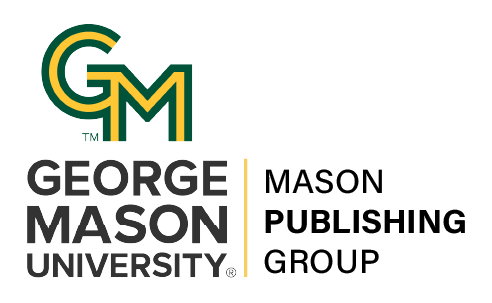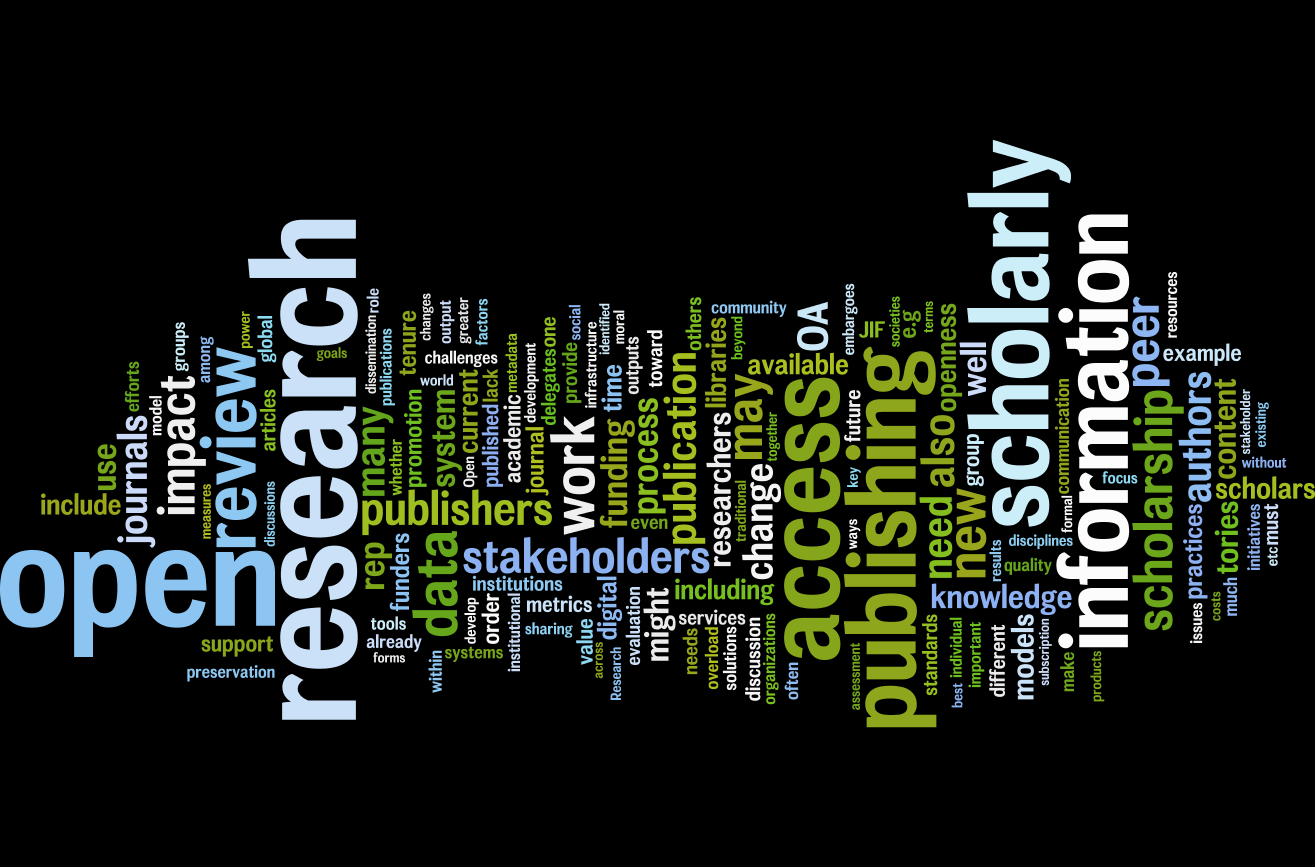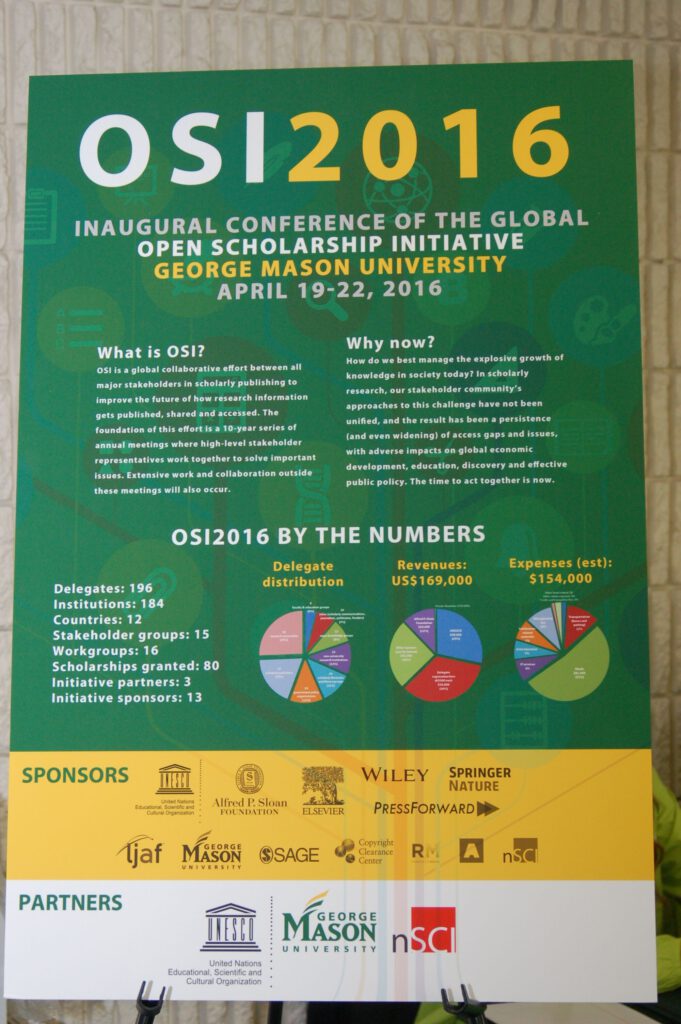
Mason Publishing has published the papers from the inaugural Open Scholarship Initiative (OSI) Conference, held in April 2016 at George Mason University, in collaboration with the National Science Communication Institute and UNESCO. OSI is a multi-year effort to establish a new, global framework in which a wide variety of stakeholders will be able to work together over the long term to shape and manage the future of scholarly publishing. The final papers and workgroup presentations can be found and downloaded at http://journals.gmu.edu/osi —all have been published under a Creative Commons license. Links to individual papers are below.
Of all the many conferences I have attended over the years—certainly more than a few hundred—OSI was the most diverse in terms of stakeholder representation from a variety of different fields and perspectives in scholarly publishing. OSI2016 convened high-level (CEO/Dean/Director) delegates from across the research and academic publishing sphere to chart the future of scholarly publishing and open access. In all, 196 delegates attended OSI2016, representing 12 countries and 15 stakeholder groups across 184 institutions, including 50 major research universities (25 percent of delegates), 37 scholarly publishers (19 percent of delegates), 24 government policy organizations (12 percent), 23 scholarly libraries and groups, 23 non-university research institutions, 17 open knowledge groups (9 percent), eight faculty and education groups, and more. Countries represented include the United States, Canada, United Kingdom, France, Germany, the Netherlands, Switzerland, Brazil, Mexico, Australia, Singapore, and South Africa.
OSI workgroup sessions and subsequent conference papers seek to answer broad, foundational questions: What do we mean by publishing? Who should decide what is and isn’t open? What are the moral implications for open and what are the usage dimensions? Other topics included the tensions between impact overload and underload; the status of preservation mandates and repositories; peer review systems and options for reform; and tracking the impact of research through impact factors and alternative metrics. The different ideas and perspectives the participants led to a wide range of ideas on how to improving the way that research is published, shared and accessed.
The What is Publishing (1) Workgroup (DOI: http://dx.doi.org/10.13021/G8630H) looked at the evolving scholarly publishing ecosystem and determined that the needs of researchers are not being met by the current system. Instead, they recommend a change to disaggregated services—unbundling the products and services that publishers currently provide and letting market forces drive the development of, and demand for, a new and improved à la carte world of knowledge artifacts and knowledge management tools.
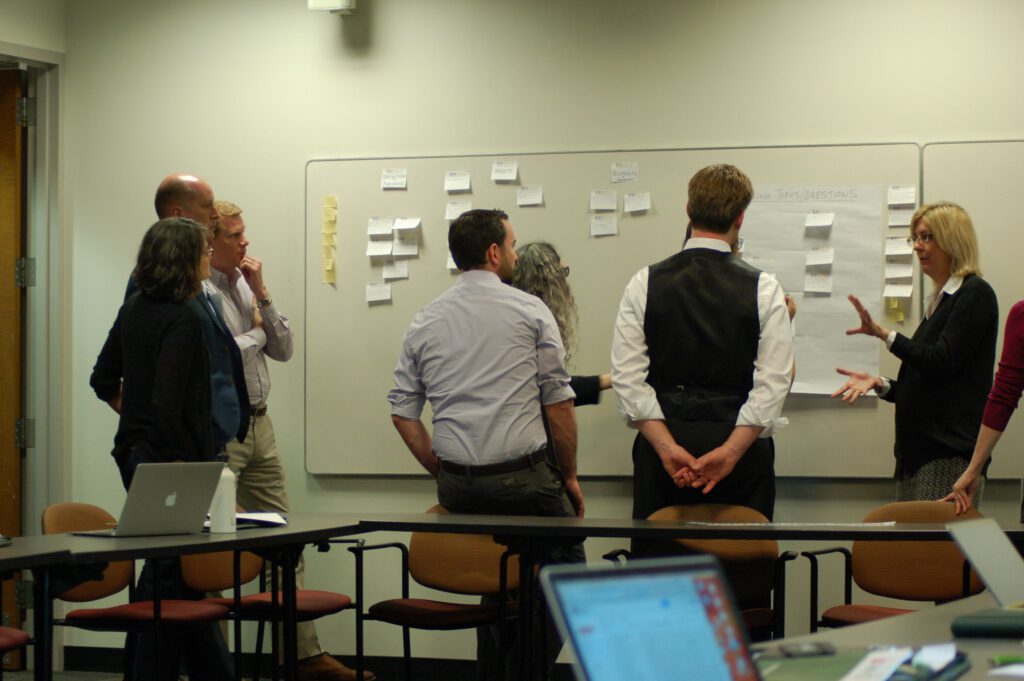
Meanwhile, the What is Publishing (2) Workgroup (DOI: http://dx.doi.org/10.13021/G8CS33) envisions a future publishing paradigm that is networked, open, and significantly more dynamic than the traditional model; their recommendations include identifying gaps in evidence and knowledge and working to define unmet publishing and dissemination needs of scholars.
The What is Open? Workgroup (DOI: http://dx.doi.org/10.13021/G8XK5R) found that the scholarly community’s current definition of “open” captures only some of the attributes of openness, which instead exist along a broad spectrum of attributes. Their framework proposes an alternative way of describing and evaluating openness based on four attributes—discoverable, accessible, reusable, and transparent—the “DART Framework for Open Access.”
Who decides the future of open access and who has the power to make decisions that can affect the future of open access? The Who Decides? Workgroup (DOI: http://doi.org/10.13021/G8P30V) examined stakeholders and their power as actors of change. Their report offers three possible change scenarios: in the way scholars are evaluated, the way some innovations in scholarly publishing can be nurtured, and the way cooperation can empower a “global flip” of existing research journals to open access.
The Moral Dimensions of Open Workgroup (DOI: http://dx.doi.org/10.13021/G8SW2G) considered the moral foundations of knowledge production and access that underlie models of scholarly publishing. Their report identifies seven moral dimensions and principles to open-access scholarship and data, recognizing the moral responsibility to maximize the benefits of scholarly publishing for the larger society.
The Usage Dimensions of Open Workgroup (DOI: http://dx.doi.org/10.13021/G8FK5D) identified definitions, priorities, and themes, including the character of research outputs and the actual research workflow process, as well as economic considerations.
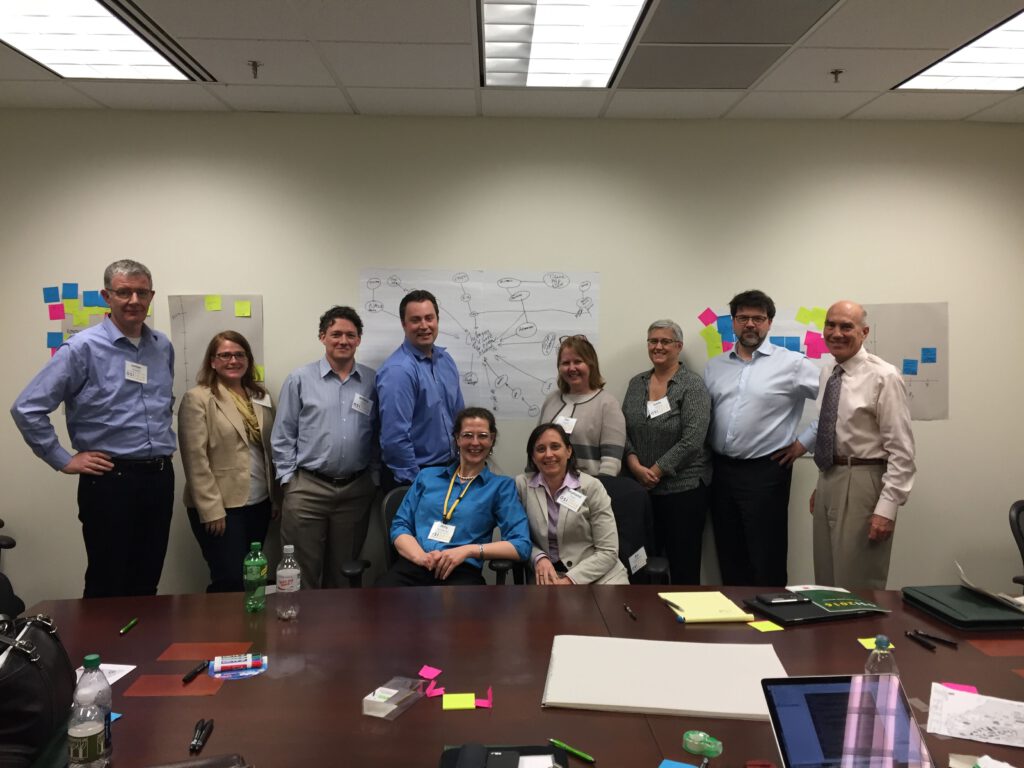
Two groups examined how scholarly publishing tools and products are evolving. The Evolving Open Solutions (1) Workgroup (DOI: http://dx.doi.org/10.13021/G8VS3F) considered barriers to openness, such as flawed incentives, and how these barriers can be overcome. Their recommendations included defining an ideal future and an alternative system for funding, tenure, and promotion.
The Evolving Open Solutions (2) Workgroup (DOI: http://dx.doi.org/10.13021/G8ZK52) assessed the most significant challenges confronting academic publishing over the next 3-5 years and proposed recommendations centered on themes of culture change, funding/sustainability, and the unique infrastructural requirements for different disciplines and diverse forms of research output.
The Open Impacts Workgroup (DOI: http://dx.doi.org/10.13021/G8488N) identified three areas for a new framework for understanding the impact of open: measuring openness, utilization measures, and understanding economic impacts of open.
The Participation in the Current System Workgroup (DOI: http://dx.doi.org/10.13021/G82C7P) focused on authors, who play a critical role in the scholarly communications system as the original content creators, are in many or most cases the original rightsholders, and are generally the ultimate decisionmakers when it comes to how, when, and where to publish their work. Envisioning a “perfect world” for authors, the group made recommendations for reforms, messaging, and research that could address many common author concerns and create a more hospitable framework for authors to participate in the open publishing system.
The Information Overload & Underload Workgroup (DOI: http://dx.doi.org/10.13021/G8R30G) discussed access as a core aspect of the issue of overload and underload—both access to research materials and access to venues where one can contribute to the scholarly corpus. The group explored factors and causes of information overload and underload, and developed ideas for social and technology solutions addressing these issues.
The Repositories & Preservation Workgroup (DOI: http://dx.doi.org/10.13021/G89W24) found that while repositories are a vital tool in modern information management and a key component of preservation and long-term availability, they are not well-suited to the multitude of stakeholders in the modern scholarly publishing system. Among their recommendations for strengthening repositories and standardizing preservation processes are building new workflows and an ecosystem that will better ensure long-term access and preservation.
The Peer Review Workgroup (DOI: http://dx.doi.org/10.13021/G8K88P) focused on peer review in the context of open scholarship and found that while greater openness and transparency would improve accountability, minimize bias, and encourage collaboration, there are significant challenges as well as a great variation in readiness across disciplines and publishing models. The group recommended facilitation of peer review outside the traditional publication process—for example, in the context of preprint servers and after publication—with incentives for broad participation.
The Embargoes Workgroup (DOI: http://dx.doi.org/10.13021/G8S014) categorized publication embargoes into four main types and focused on two: post-publication and subscription embargoes. Their recommendations include creating an evidence base for embargoes by funding a global survey of key stakeholders. They propose questions for the survey that would provide meaningful data about the issues surrounding embargoes.
The Impact Factors Workgroup (DOI: http://dx.doi.org/10.13021/G88304) focused on the uses and misuses of the Journal Impact Factor (JIF), with a particular focus on research assessment. The group’s recommendations include active support for the San Francisco Declaration on Research Assessment (DORA) by research funders, higher education institutions, national academies, publishers and learned societies as well as the creation of an international “metrics lab” to explore the potential of new indicators and the wide sharing of information on this topic among stakeholders.
Finally, the At-Large Workgroup (DOI: http://dx.doi.org/10.13021/G80K5C), of which I was a member, was the largest and most diverse in terms of stakeholder representation, observing workgroup conversations during the meeting and used their wide-angle lens on the evolution of these questions and proceedings in order to develop some high-level takeaways on the OSI conference. These included observations on the format and process of the conference, the widespread theme of changing scholarly needs and outputs, the primacy of promotion and tenure in discussions on change in scholarly publishing, stakeholders and missing voices at OSI, the influence of impact, and recommendations going forward toward OSI 2017 and beyond.
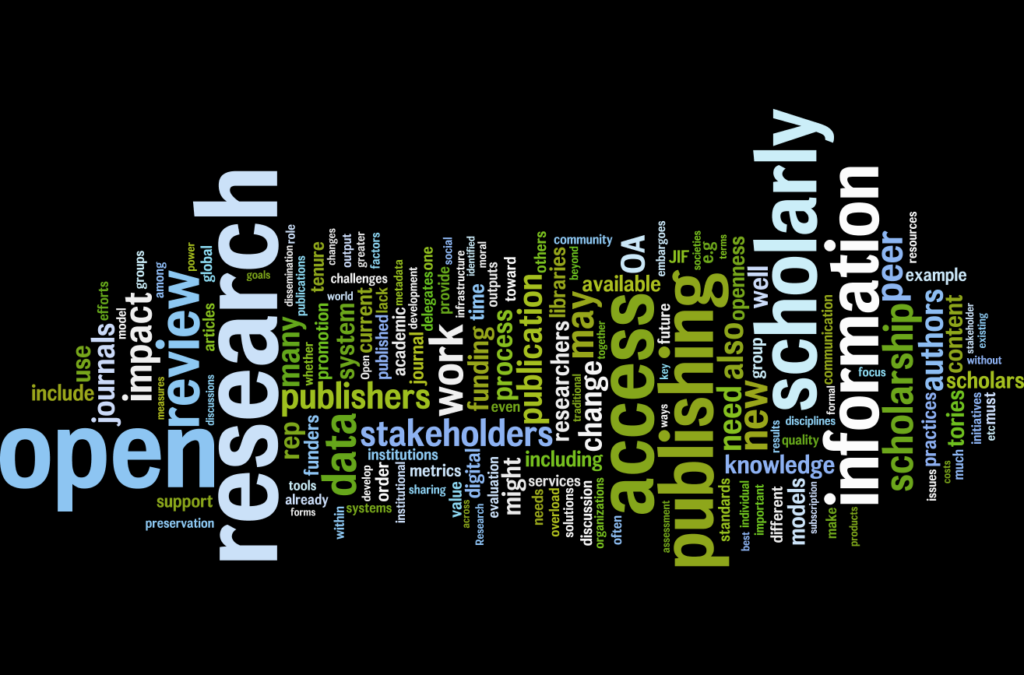
The At-Large paper discusses some of the common themes found throughout the workgroup sessions and papers. This word cloud—created from the compiled texts of all sixteen conference papers—also highlights the most frequent terms and themes discussed at OSI2016.
If you are interested in attending OSI2017, to be held in April 2017 at George Washington University, email mailto:osi2016@nationalscience.org or visit our contact page at: http://osinitiative.org/contact/
